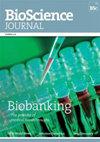北方寒冷地区金合欢和燕麦根叶内生真菌的群落结构
IF 0.6
4区 农林科学
Q3 AGRICULTURE, MULTIDISCIPLINARY
引用次数: 0
摘要
为了探索荞麦(Fagopyrum Mill)和燕麦(Avena sativa)的内生真菌,利用Illumina Miseq高通量测序技术,分析了荞麦和燕麦成熟期叶片和根系内生真菌的群落结构和多样性。群落结构分析结果显示,在97%的序列相似性水平上,荞麦根有205个操作分类单元(otu),荞麦叶有181个操作分类单元(otu)。在燕麦的根和叶中分别有152和127个otu。在门水平上,荞麦根和叶的内生真菌以子囊菌门和担子菌门为主,燕麦根和叶的内生真菌以子囊菌门为主。α多样性分析表明,荞麦根的Ace指数、Chao指数和Shannon指数均高于荞麦叶,燕麦根的3个指数均高于燕麦叶,说明根内生真菌群落的丰富度和多样性高于叶片。通过对荞麦和燕麦进行显著差异分析,发现了生物标志物。荞麦和燕麦的内生功能群主要分布在病养菌和腐养菌中。本研究结果为充分利用荞麦和燕麦内生真菌优势资源,进一步开发微生物肥料奠定了基础。本文章由计算机程序翻译,如有差异,请以英文原文为准。
Community structure of endophytic fungi in roots and leaves of Fagopyrum mill and Avena sativa in a Chinese northern cold region
In order to explore the endophytic fungi of Fagopyrum Mill and Avena sativa, Illumina Miseq high-throughput sequencing was used to analyze the community structure and diversity of endophytic fungi in leaves and roots of buckwheat and oat at the mature stage. The results of community structure showed that there were 205 operational taxonomic units (OTUs) in buckwheat roots and 181 OTUs in buckwheat leaves based on 97% sequence similarity level. There were 152 OTUs and 127 OTUs in the root and the leaf of oat, respectively. At the phylum level, Ascomycota and Basidiomycota were the dominant endophytic fungi in buckwheat roots and leaves, while Ascomycota was the dominant endophytic fungus in oat roots and leaves. Alpha diversity analysis showed that the Ace index, Chao index and Shannon index of buckwheat roots were higher than that of buckwheat leaves, and the three indices of oat roots were also higher than that of oat leaves, indicating that the richness and diversity of endophytic fungi community in roots were higher than that in leaves. Biomarkers were found by significant difference analysis in buckwheat and oat. The endophytic functional groups of buckwheat and oat were mainly distributed in Pathotroph and Saprotroph. The results of this study laid a foundation for fully exploiting the dominant endophytic fungal resources of buckwheat and oat and further developing microbial fertilizers.
求助全文
通过发布文献求助,成功后即可免费获取论文全文。
去求助
来源期刊

Bioscience Journal
Agricultural and Biological Sciences-General Agricultural and Biological Sciences
CiteScore
1.00
自引率
0.00%
发文量
90
审稿时长
48 weeks
期刊介绍:
The Bioscience Journal is an interdisciplinary electronic journal that publishes scientific articles in the areas of Agricultural Sciences, Biological Sciences and Health Sciences. Its mission is to disseminate new knowledge while contributing to the development of science in the country and in the world. The journal is published in a continuous flow, in English. The opinions and concepts expressed in the published articles are the sole responsibility of their authors.
 求助内容:
求助内容: 应助结果提醒方式:
应助结果提醒方式:


